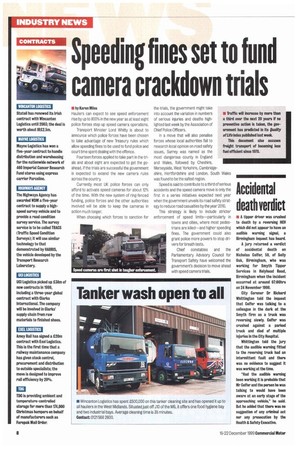Speeding fines set to fund camera crackdown trials
Page 10

If you've noticed an error in this article please click here to report it so we can fix it.
• by Karen Miles Hauliers can expect to see speed enforcement rise by up to 800% in the new year as at least eight police forces step up speed camera operations.
Transport Minister Lord Whitty is about to announce which police forces have been chosen to take advantage of new Treasury rules which allow speeding fines to be used to fund police and court time spent dealing with the offence.
Fourteen forces applied to take part in the trials and about eight are expected to get the goahead. If the trials are successful the government is expected to extend the new camera rules across the country.
Currently most UK police forces can only afford to activate speed cameras for about 12% of the time. With the new system of ring-fenced funding, police forces and the other authorities involved will be able to keep the cameras in action much longer.
When choosing which forces to sanction for the trials, the government might take into account the variation in numbers
of serious iqiuries and deaths highlighted last week by the Association of Chief Police Officers.
In a move that will also penalise forces whose local authorities fail to research local opinion on road safety issues, Surrey was named as the most dangerous county in England and Wales, followed by Cheshire, Merseyside, West Yorkshire, Cambridgeshire, Hertfordshire and London. South Wales was found to be the safest region.
Speed is said to contribute to a third of serious accidents and the speed camera move is only the first in a series initiatives expected next year when the government unveils its road safety strategy to reduce road casualties by the year 2010.
This strategy is likely to include stricter enforcement of speed limits—particularly in towns and cities, where most pedestrians are killed—and higher speeding fines. The government could also grant police more powers to stop drivers for breath tests.
Chief constables and the Parliamentary Advisory Council for Transport Safety have welcomed the government's decision to move ahead with speed camera trials.
































































































